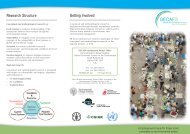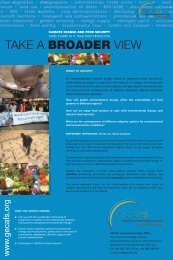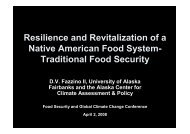From Food Production to Food Security - Global Environmental ...
From Food Production to Food Security - Global Environmental ...
From Food Production to Food Security - Global Environmental ...
- No tags were found...
You also want an ePaper? Increase the reach of your titles
YUMPU automatically turns print PDFs into web optimized ePapers that Google loves.
considers the inadvertent impacts of governance on food systems, for instance the interactionbetween biofuels, energy efficiency or carbon sequestration projects and food security.Enhanced research on food system governance clearly has many interesting and highly usefulavenues <strong>to</strong> explore and would be a major contribution <strong>to</strong> alleviating food insecurity.Box 1 The E. coli outbreak in Germany, June 2011: an example of multi-level food systemgovernance failure regarding food safety.The response <strong>to</strong> E. coli outbreak in Germany in June 2011 is a good example of the complexitymulti-scale, multi-level interactions bring <strong>to</strong> food safety aspects of food system governance. Ithighlights – in this case – monocentric governance failings. The contamination was initiallythought <strong>to</strong> have come from the import of Spanish produce in<strong>to</strong> Germany (later proved wrong) andthereby spanned spatial and jurisdictional levels. At European level, the aim is <strong>to</strong> promote tradebetween member states, but also <strong>to</strong> have public food safety systems for the region in place.National food safety and health agencies are only mandated <strong>to</strong> operate within the nationalboundaries, i.e. on a different jurisdictional level. With the health problem being largely confined<strong>to</strong> the Hamburg region, the local health management had <strong>to</strong> address the immediate health problem.All these levels have a monocentric system in place, operating at the respective level. Given thesethree distinct spatial and jurisdictional levels, it is hard <strong>to</strong> establish who is in charge of managingthe situation, and what the formal lines of communication are. The monocentric approach did notappear able <strong>to</strong> deal with the multi-level emergency.As reported in a Leading Article in The Independent (11 June 2011) the E. coli outbreak exposedflaws in food system governance in Germany and in Europe: “Germany’s federal structure, inwhich most responsibility for health is devolved <strong>to</strong> individual states, may be a fac<strong>to</strong>r in the ill-coordinatedresponse. … Nor was the EU well equipped <strong>to</strong> compensate for failings at Germannational level. EU officials could do little more than watch as the Germans and Spanish tradedinsults, even though the E. coli outbreak was claiming victims across Europe and growers not onlyin Spain faced ruin”. The cross-level interactions within the food system, spanning multiple foodsystem activities affecting food system outcomes related <strong>to</strong> food safety, food production andlivelihoods could perhaps have been better managed had an adaptive governance system been inplace, or rapidly arisen. Health researchers could have communicated informally with each otherand with growers, possibly ascertaining the source of contamination more quickly. This “adaptivegovernance” approach proved successful in the case of the SARS outbreak in SE Asia in 2006,where an informal network of scientists provided a faster ‘solution’ than the formal monocentricsystems at the international and national levels (C. Termeer, pers comm).Practical challenges <strong>to</strong> implementing food security researchThe sub-sections above identify many conceptual scientific challenges <strong>to</strong> improving foodsecurity. Methodological challenges also arise, and although several are discussed in Paper 6,a few are worth stressing here, in the context of the scientific advances and challengesidentified above:121











